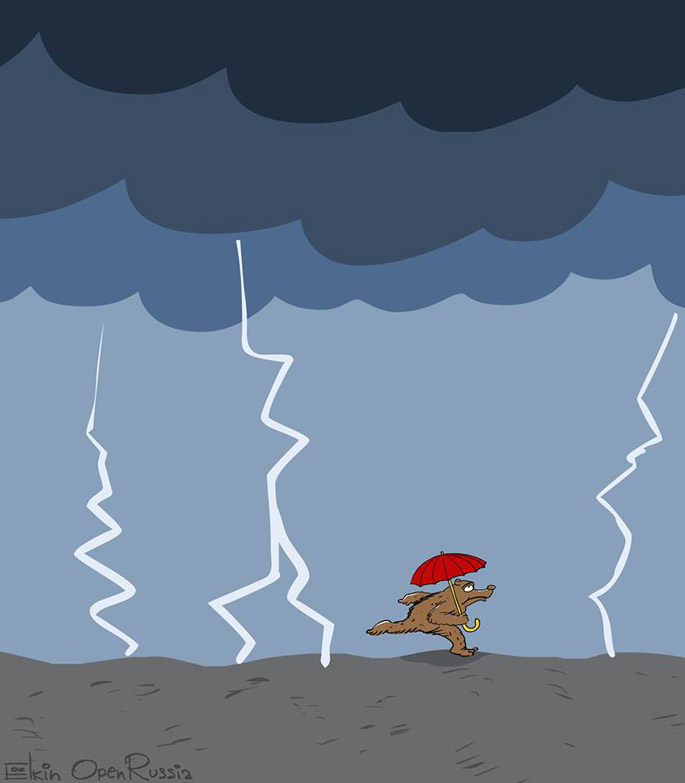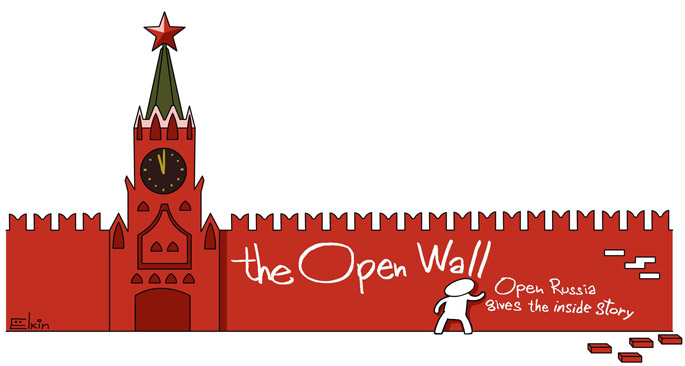Lightning never strikes twice
Lightning never strikes twice
On Thursday, the Russian president held a Q&A with his subordinates – the Russian nation. It was slick, and tightly controlled, but something wasn’t quite right …

This time round (the 14th time) the televised role-playing game known as Direct Line with Vladimir Putin lasted 3 hours 40 minutes; and will be remembered as much for its off-camera machinations as for what was actually said onscreen.
On the day, the RBC newspaper (which, funnily enough, was experiencing Kremlin problems of its own – see below) reported that the programme’s participants had been briefed on how to converse with the president. Castings and interviews were used to whittle down several hundred would-be audience members to a few dozen people, these select few being granted the right to speak to Putin, while the rest were relegated to the status of extras, and denied the right to any voice at all. As for the actual questions, some participants were permitted to ask their own, but others were forced to give voice to queries “prepared in advance by the organisers.”
“Participants were advised not to tell anyone about how they’d been prepped for the show – not even their relatives. According to sources close to the programme’s organisers, people were even advised against leaving the rehearsal venue right up until the programme was due to air.”
This year’s Direct Line featured Putin the Peace-Loving: he called Barack Obama a “decent man,” admitted an affinity with the Ukrainian and Turkish peoples, chided Ramzan Kadyrov for threatening the opposition, and, when asked what other enemies would be targeted by Russian Aerospace Forces, answered that Russia’s primary targets were to build more roads and reduce disorderliness.
But even as Putin agreed, in the presence of millions of witnesses, with the suggestion that business should be freed from the excessive interference of regulatory bodies, the headquarters of the Onexim Group, a few miles from the Kremlin, were being raided by the FSB.
According to TV Rain, the raid was a means of applying pressure on Onexim’s billionaire owner Mikhail Prokhorov, thereby forcing him to sell his RBC media group (which includes the said RBC newspaper, and is behind various journalistic investigations that have irked the regime over the years).
And it’s a good thing that Putin doesn’t appear to entertain any illusions about the prompt return of foreign investment to the country – otherwise the raid on IKEA’s Russia headquarters (which also, almost exactly coincided with the president’s pronouncements) would seem a provocation too far.
A few days before Direct Line aired, Putin’s press secretary Dmitry Peskov warned that many Russians were “simply beside themselves with anger at the condition of [the country’s] roads.” So it was with the question of roads that the show kicked off: “Please, just take a look at what a state they’re in,” lamented Yekaterina from Omsk. “It’s pothole after pothole around here, cars breaking down, wheels falling off.” Vladimir Putin immediately conjured an answer to this most eternal of Russia questions: “Some time ago we established regional road funds and have been allocating considerable resources to them. The funds are quite substantial, but a lot of money is getting repurposed. [For regional chiefs], these funds have always been, and still are, a sort of war chest from which they could extract money for other purposes – and not illegally so. The funds should be earmarked specifically for road construction or repair …”
Unfortunately, Putin failed to specify exactly which laws permit the misappropriation of regional road funds, but he certainly can’t have been talking about Article 179.4 of the Budget Code of the Russian Federation, which strictly concerns budgetary provisions towards “the design, construction, reconstruction, and repair of public highways.” And the law entitled “On the Road Fund of Omsk Region” doesn’t leave a lot of room for interpretation either.
Meanwhile, a comment regarding the under-construction of the Kerch Strait Bridge, which will eventually connect Crimea to the Russian mainland, prompted the president to recall the herculean construction efforts of his old buddy Arkady Rotenberg: “I was happy to see how the construction of the bridge was progressing. I must say in all honesty that there’s usually no shortage of volunteers to take on construction projects of this sort. But in this case, we really struggled to find a company to take on the project – both on account of the limited financing but also due to a number of other restrictions that the contractors would have to contend with. Nevertheless, we did find a contractor – they’ve embarked upon the project, and successfully so, having passed the strict selection procedures.”
According to Forbes, however, Rotenberg was awarded a record-setting 555.5 billion roubles (£5.2 billion) of state contracts in 2015, with projects awarded to him without competition generating 77% of this sum. The Kerch Strait Bridge, set to earn him 228.3 billion roubles, is just such a project – and was awarded to Rotenberg’s company Stroygazmontazh despite the fact that the latter lacks any prior experience of bridge construction.
Another old friend of Putin’s referenced by the president during the Direct Line was Sergei Roldugin, the cellist and businessman manqué implicated in the Panama Papers scandal. Having first pronounced the information concerning Rodulgin’s offshore businesses to be “reliable,” Putin then went on to call the scandal a “provocation” orchestrated by “official US agencies.” It was then that the friendly guise adopted by the president for the purpose of the Q&A finally faltered: “This isn’t about specific individuals, whatever their position in Russia. This is about a country that cannot be manipulated or forced to march to the beat of somebody else’s drum.”
But a factual, rather than merely emotive, justification of Roldugin’s actions was beyond even Vladimir Putin: the president seemed to suggest that Roldugin spent all his offshore funds ($2 billion dollars, according to investigators) on expensive musical instruments, which he then moved to Russia, keeping some for himself and donating others to cultural institutions. But journalists have been able to uncover no trace of Roldugin’s munificence, while Vedomosti has also ascertained that Russia imported a mere $48.1 million worth of musical instruments in 2015. Nevertheless, Putin stuck to his guns: “The last cello bought by Roldugin [cost] around $12 million. It’s called ‘Stuart’ and was made by Stradivarius. The legendary King of Prussia, Frederick the Great, was its first owner.” It’s also a well-known fact that there are 63 extant Stradivarius cellos – so, at $12 million a pop, that $2 billion of offshore funds would buy the whole collection 2.6 times over …
What can we take away from the president’s performance? You avoid answering directly any direct questions, on the assumption that if you run fast enough, lightning never strikes twice. But who knows … shortly before Direct Line went on air, reports emerged that Anton Tyurishev, who’d informed Putin, on last year’s Q&A, about the non-payment of wages to workers at Vostochny Cosmodrome, had been detained for five days in Ussuriysk, allegedly because he and his colleagues had been planning a protest rally to mark the one-year anniversary of his appeal to the president (the workers still haven’t been paid).
This logic of persecutions and witch-hunts has long become self-perpetuating. The president can talk about “creating a favourable business climate” as much as he likes, but in a year’s time, it may well be that the security forces aren’t just raiding the offices of Onexim or IKEA, but coming to take away “Granny Zina,” who so touched Vladimir Putin with her wishes of good health for the president.




